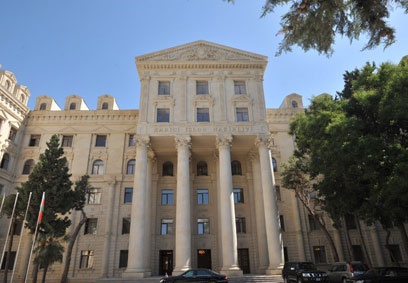Armenian FM attempting to justify country’s failed foreign policy with false statements

By Sara Rajabova
Armenian Foreign Minister Edward Nalbandian has lost his sense of reality trying to justify failed foreign policy of Yerevan and the increasing isolation of the country with making false statements.
Acting spokesman of the Azerbaijani Foreign Ministry Hikmat Hajiyev made the remark on September 21 in reaction to the Armenian foreign minister's recent statements.
Addressing the 5th Armenia-Diaspora Conference on September 20, Nalbandian said international community "completely understands" Armenia's position on the Nagorno-Karabakh conflict.
Hajiyev said the international community is in favor of the resolution of the Nagorno-Karabakh conflict within the territorial integrity, sovereignty and inviolability of Azerbaijan's borders.
The Nagorno-Karabakh conflict emerged in 1988 when Armenia made territorial claims against Azerbaijan. Since a lengthy war in the early 1990s that displaced over one million Azerbaijanis, Armenian armed forces have occupied over 20 percent of Azerbaijan's internationally recognized territory, including Nagorno-Karabakh and seven adjacent regions.
Hajiyev noted that the diplomatic successes of Azerbaijan in the first nine months of this year have shed more light on Nalbandian's lies. He emphasized that the facts speak for themselves.
"In the final declaration of the NATO Summit in Wales, member states of the organization expressed support for the territorial integrity and sovereignty of Azerbaijan, noting that the conflicts in the South Caucasus should be resolved on the basis of these principles. The declaration stressed the unacceptability of the use of force against the territorial integrity of the countries, and the need to respect the internationally recognized borders," Hajiyev said.
He went on to note that Nalbandian himself, as well as Armenian President Serzh Sargsyan attended that meeting of NATO.
"Also, Saudi Arabia hosted a session of the Council of Foreign Ministers of the Organization of Islamic Cooperation on June 18-19, which adopted a declaration expressing member-states' solidarity with the just position of Azerbaijan on the Armenian-Azerbaijani Nagorno-Karabakh conflict. Also the session adopted resolutions called "The aggression of Armenia against Azerbaijan" and "Destruction and desecration of the Islamic historical and cultural heritage and places of worship in the occupied Azerbaijani lands as a result of the aggression of Armenia against Azerbaijan"," Hajiyev said.
He further added that after the meeting of Foreign Ministers of Non-Aligned Movement held on May 28-29 in Algiers, a document was adopted, which expressed support for UN Security Council resolutions on the issue and the resolution of the conflict within the territorial integrity, sovereignty and inviolability borders of Azerbaijan.
NAM is the second organization in the world by quantity of its member countries after the UN General Assembly, Hajiyev said.
"Riyadh hosted an economic forum called The League of Arab States - Central Asia and Azerbaijan on May 13. The final declaration of this forum also emphasized that the conflict should be resolved in accordance with the UN resolutions and the principles of sovereignty and territorial integrity," Hajiyev said.
He further noted that the main point of the statements of OSCE Minsk Group during 2009-2013 years, on which Foreign Minister Nalbandian relies, was unacceptability of status quo.
Hajiyev added that in this situation, the status quo means aggression, occupation and their consequences.
"These irrefutable facts reflect the position of the international community. Instead of deceiving the Armenian nation and diasporas, Yerevan should take concrete steps to resolve the conflict to tackle the crisis in the country," Hajiyev said.
Since a war in the early 1990s, Armenian armed forces have occupied 20 percent of Azerbaijan's territory, including Nagorno-Karabakh and seven surrounding regions. A fragile ceasefire has been in place since 1994, but long-standing efforts by U.S, Russian and French mediators have been largely fruitless so far.
Armenia has not yet implemented the U.N. Security Council's four resolutions on its pullout from the neighboring country's territories.
Here we are to serve you with news right now. It does not cost much, but worth your attention.
Choose to support open, independent, quality journalism and subscribe on a monthly basis.
By subscribing to our online newspaper, you can have full digital access to all news, analysis, and much more.
You can also follow AzerNEWS on Twitter @AzerNewsAz or Facebook @AzerNewsNewspaper
Thank you!
